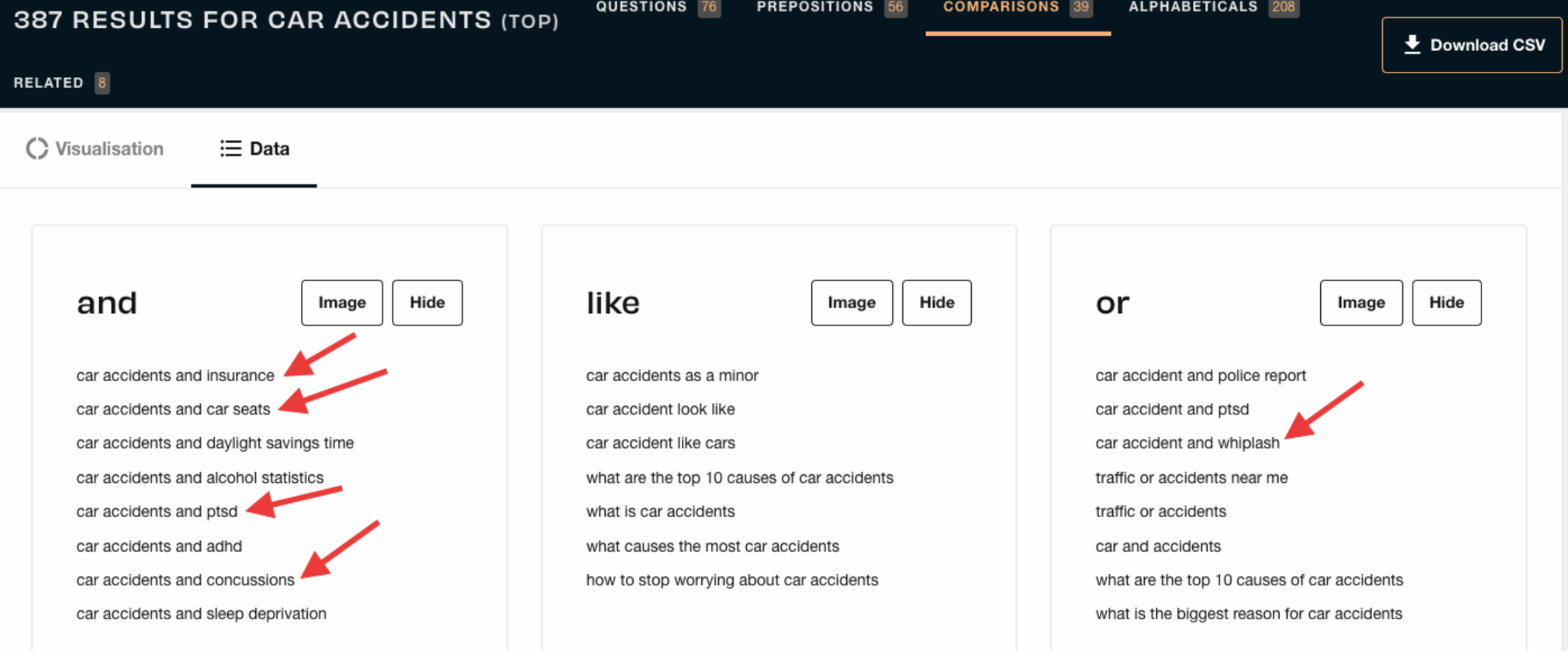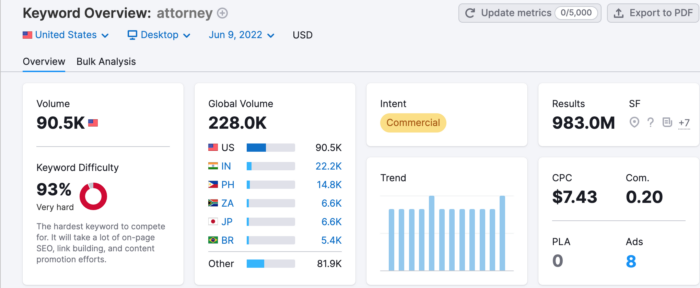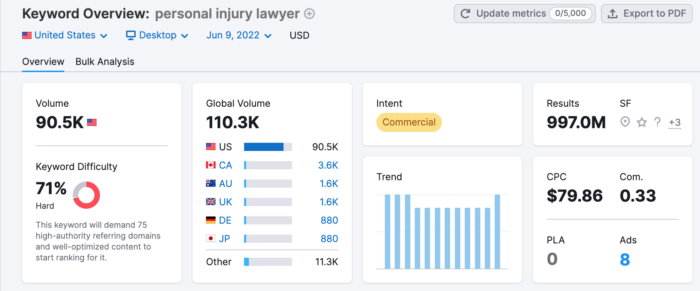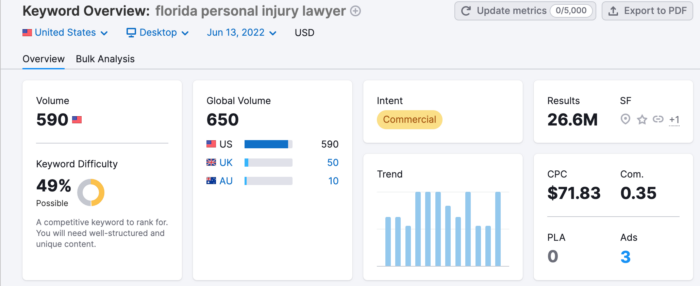Blogging, for lawyers, is the difference between your phone ringing and having to chase down your potential clients.
It helps you:
Ultimately, these things get you more leads – qualified leads.
The lawyers blogging get leads that add an extra figure to their firms’ accounts.
Your next case has to come from somewhere, right? Why not cast a wider, more intentional net?
Here’s the deal about blogging for lawyers:
Once you publish a law firm blog post to your website, it’s promoting your law firm 24/7. It’s also attracting new visitors (aka potential clients) to the page long after publication.
But, blogging takes time, extra hours you might not have or prefer to use with your family in the evenings or on the weekends. Luckily, you don’t have to be the one who does it.
You can engage a team of writers focused on law-related topics and dedicates themselves to helping you connect with potential contacts.
Here’s how to get the leads you want with time to spare.
FAQs about how to blog for lawyers
- How frequently do I blog?
How frequently you blog is up to you. There’s no recommended standard except to remain consistent.
If you bring on a content team, they’ll offer suggestions considering your business goals, financial plan, and the competitiveness in your professional field..
- What to post on my blog?
Blog topics are everywhere.
All you have to do is remain aware of your audience’s needs and develop a content plan.
AnswerThePublic is an excellent – and free – audience listening tool that generates hundreds of ideas on a topic using real-time search queries. The results are actual questions and phrases people are typing into Google.
Take a look:
We used “car accident” as the topic, which rendered 387 results. Not all of the results are useful, but there are many gems for a personal injury law firm to consider:

You’ll want to repeat this practice for each topic relevant to your law firm and download your results to a spreadsheet — single or combined.
The goal is to have a master spreadsheet with all the topics you’ll write about and when. We refer to this spreadsheet as your content plan.
Though it’s time-consuming, we never skip this crucial step when creating content for our clients’ websites. A content plan is the only way to manage and monitor the success of your content efforts.
Besides, where else will you house all these fantastic ideas?
More blog post ideas for lawyers
You can also publish blogs that share your insight on the laws governing your practice areas and community-related events:
- Updates from your firm
- Answers to client questions
- Highlights from your practice area
- Lessons from experience
Remember, your unique perspective will take your content above the rest.
Advantage #1: Stand out from your competitors
There are people out there who haven’t heard of you – and would hire you if they did.
Here’s how you get their attention:
You talk to them.
Conversation Starter: Be a thought leader
To be a thought leader in your field, use your unique perspective to stand apart from your competitors. Not just with your legal know-how but your personality, passion, or purpose.
Rhea Wessel of the Institute of Thought Leadership calls this combination “discovering your thought leadership sweet spot.”

If you’re writing about a topic outside of your wheelhouse or passion, it’s not a thought leadership piece.
For example, you probably know your stuff if you have years of experience helping people get compensation after a car accident.
If you’ve lost interest in prosecuting accident cases over those years, your piece won’t ring genuine.
Readers want information from people they can trust and who care about what they’re sharing. They can feel your boredom between the lines; if they do, they won’t value the expertise you’re imparting to them.
Consider the value you’re giving the audience with your blogs. Reading a blog takes time, and it should be your goal to make it worth their while.
Think about where your experience and passion meet.
Maybe it’s no longer in car accident cases. Perhaps you’ve found your purpose in helping people move on after a severe dog bite or attack.
Share the information and personal experience you’ve gathered along the way. Your P.O.V. is what excites readers, and it’s what sets your content above everyone else’s.
Conversation Starter: Listen to your clients
Listening to your clients is essential.
They have questions. And chances are, your potential clients have the same questions. So, share your answers.
Post answers to questions you have yet to address and show people you’re in tune with their needs.
Remember, you can ask your clients questions, too. Pick their brains to uncover what they want to learn. Then, figure out how you can approach that topic in your way.
Not everyone thinks to survey their clients; your copy will show the difference when you do.
Advantage #2: Spend less on paid ads
You don’t have to keep checking the budget to see if you can put more toward ads.
Paying for ads isn’t the “end all” answer. They’re a great way to draw attention to your website…until you stop paying for them.
Blogs drive traffic long after they’re published, with little upkeep.
SEMRush’s 2021 blogging statistics report states that “blogging is so scalable and affordable that it’s the third most common content marketing strategy for businesses.”
Every blog post you create is an opportunity to attract new visitors to your website. The more quality pages you publish to the web, the more Google rewards you.
Think about the number of pages you have on your site now. You can probably count them on your fingers.
Building your blog increases your chances of achieving better positions (“rankings”) in Google’s search results pages.
Dramatically.
“On average, companies who blog produce 67% more leads per month.”
Blog about your practice area and advertise your legal services. And don’t forget to promote yourself, too.
How to: Get specific with your keywords
Keywords are the phrases people type or speak into search engines to find information on the web. They’re your best friends when pursuing new cases from your website.
Making material focused on particular or ‘long-tail’ keyword can enhance your possibility of getting better positions and drawing in worthwhile contacts.
Let us explain…
Say you create content around the short and commonly used word attorney. The online visibility tool SEMRush puts this keyword at a 93% difficulty. Translation: achieving a high ranking for this keyword is next to impossible.

However, when you get more specific and choose to create content around a keyword like personal injury lawyer, the difficulty to rank decreases:

Get even more specific and create content around what you do and where you are (Florida personal injury lawyer), and your chances of ranking improve further:

The better your pages rank in the search engine results pages (SERPs), the more visitors you’ll attract, and the more calls you’ll get from people seeking you out.
WIN-WIN-WIN!
Advantage #3: Grow your online community
Stop opening Facebook, staring at your tablet, and wishing for inspiration.
Your blogs are waiting to make their debut with your followers.
Share your blogs on your social channels and use the same content to attract leads from different platforms.
Your blog can perform well in the search engines and still miss your followers.
Learn the art of teasing
Post a teaser on your firm’s social channels with every new blog post you publish on your website.
Teasers can be a:
- List of the questions you answer in the post
- Few key takeaways
- Backstory of the blog
- Compelling statistic
- Place to get creative
Then, provide a link to the entire blog post on your website. This tactic grabs a reader’s attention and directs them to your site.
Here‘s an example:

Let readers know what they’re about to get into, but don’t give everything away in your caption. Spark intrigue to get them to your website.
By sharing your blog posts across platforms, you reach more people without having to generate fresh content every day.
Avoid over-promoting your blog posts
Avoid posting only blog teasers on your social media, though. Social media is for boosting your audience’s engagement too.
Comment on others’ posts, answer questions, and share content from other people.
Not all content you share should be original content. Your readers will get bored if you’re only plugging your blog.
Here’s what we mean:

Share resources from the people and sources you read. You want other people to share your content, so share theirs first.
Your next lead may come from someone who shared your content to return the favor.
Keep an eye on local news
Not all local news is relevant to your practice areas, but people want to see you care about your community.
- Pitch blog topic ideas inspired by things happening in your community.
- Offer recommendations for resources in your area.
- Put out safety information after a hazardous event.
Why?
Your local community is smaller than your state and legal field.
Community-specific content resonates with people, and people are quick to share it. And they’re more likely to link to it in their content, especially if they know you.
Blog for a smaller audience, and you’ll increase your chances of making meaningful connections — specifically, getting links back to your posts from other websites (aka backlinks).
Metrics reporting tool, Databox, interviewed 80 SEO experts and found that backlinking is one of the most crucial factors in search engine optimization.
Make those connections and boost your rankings in the SERPs.
There’s a reason you don’t see lawyers blogging in their free time:
They don’t have to.
You already spend too much time on the day-to-day minutia of running your firm. Don’t let another thing hinder you from doing what you enjoy and growing your firm.
We Do Web Content cares about your firm’s success. Not to mention, creating law firm web content is all we do!
Use our team of legal marketing experts to:
- Write your blog posts
- Build your content marketing strategy
- Manage your blog
- Improve your rankings
- Support your business goals
- Promote your thought leadership
We know you can write your blog posts, but why would you?
Contact We Do Web Content or call (954) 425-9081.
Speak with the team that’s been blogging for lawyers since 2008.

Yvette Valencia is the Latina founder and CEO2 of We Do Web Content, a content marketing agency for law firms and one of Inc. 5000’s fastest-growing private businesses in America. She’s a 14-year content marketing veteran and Six Sigma-certified Green Belt credited with developing the proven (and repeatable) process for creating top-ranking website content at scale for attorneys.

